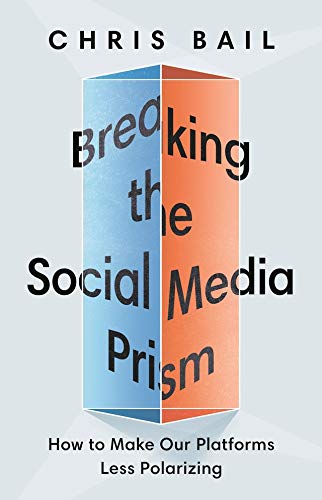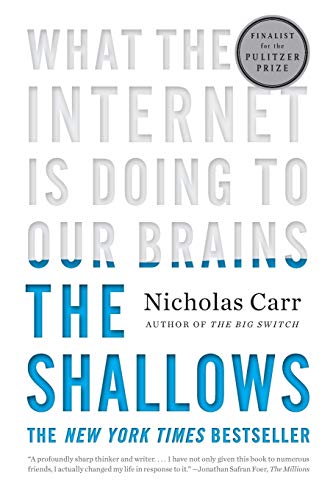Digitalization has almost overshadowed Globalization even in its untrammeled rise and proliferation. While the power of the internet has revolutionised the way we live and work in more beneficial ways than one, it also comes with its own deadly can of worms. In an age of post truths, intrusive surveillance and deep fakes, the internet has the power nor just to rapture but to rupture as well. Here are 5 books that warn the tech user against the perils of polarization.
1
Shattering popular myths and in the process, uncovering some extraordinary revelations, Chris Bail’s enormously influential book, “Breaking The Social Media Prism” is a much needed antidote in, and, for bewildering times where fake news proliferates and political polarization runs amok on various social media platforms. People hurl abuse and vitriol in 280 characters at one another, and are even ready to severe painstakingly nurtured family ties just to keep alive the embers stoking their flaming ideologies. In fact, economists Keith Chen and Ryne Rohla after tracking the average length of time people spent at Thanksgiving dinner several weeks after the divisive 2016 presidential election found that Thanksgiving dinners were 30–50 minutes shorter if they were attended by a mix of people from Republican- and Democratic-leaning voting precincts. Bail is a professor of sociology and public policy at Duke University, and also the director of the Polarization Lab at Duke. Engaged in the study of ‘computational social science’, Bail and his team conduct studies on online political behavior. Some of the findings thrown up by their research is, putting it mildly, jaw dropping. For example, the concept of ‘echo-chambers’ is most touted to be at the centre of all internet prejudices and biases that lead to online extremism. Hence the exhortations by social media experts for users to ‘step out of their echo-chambers.’ But what is it that exactly happens to/with a user when she does indeed step out of her echo-chamber? In a curious experiment, Bail and his team persuaded a randomly selected cohort of Republicans and Democrats to persistently listen to the views of their opponents. This was with an objective to ascertain changes in attitude towards opposing factions. The outcome of the experiment revealed an unfortunate trajectory. People who were even moderately conservative became staunchly conservative and mild libertarians became more entrenched in their
2
In this blistering book – which is part philosophical and part polemic – plainly titled, “Ten Arguments For Deleting Your Social Media Accounts Right Now”, Mr. Lanier, holds forth in an eloquent, erudite and extraordinary manner, on an urgent need to disassociate oneself from all social media accounts. Mr. Lanier’s book resonates deeply with the profundity and power of each of the arguments which he lays down in support of his clarion call, and constitutes a timely, urgent and essential work that highlights the pernicious outcomes of a perpetual immersion in and entanglement with social media. Mr. Lanier should know, being the pioneer in the sophisticated technology of Virtual Reality, himself. Mr. Lanier’s Bully Pulpit revolves around the acronym, BUMMER – “Behaviours of Users Modified, and Made into an Empire for Rent.” Bummer is an insidious machinery, which, by employing a Byzantine set of algorithms and other complex Information Technology chicanery deprives users of all free will holding their thoughts, actions and deed to ransom. And atop the pile of Bummer companies stands the duo that is Facebook and Google. Mr. Lanier educates us on the six components that constitute the integral part of the Bummer machine by employing an ingenious mnemonic: A: Attention Acquisition leading to Asshole supremacy; B: Butting into everyone’s lives; C: Cramming content down people’s throats; D: Directing people’s behaviours in the sneakiest way possible; E: Earning money from letting the worst assholes secretly screw with everyone else; and F: for Fake mobs and Faker society.
3
Edward Snowden is a man without a passport. In 2013, Mr. Snowden blew the lid off a gargantuan State surveillance machinery when he copied and leaked highly classified information from the National Security Agency (NSA) which he happened to gather in his role as a Central Intelligence Agency (CIA) employee and subcontractor. Currently, in exile, the sub-contractor turned whistleblower, by his own account, dwells in a rented structure in Moscow, after having been designated a fugitive under the laws of the United States, his motherland. Popular opinion as to whether Mr. Snowden ought to be prosecuted for exposing State secrets, or feted for exposing an invidious industry for what it is, and has been all along, has taken contrasting contours. Now, Mr. Snowden has elected to bare it all, in his autobiography, imaginatively titled, “Permanent Record.” More a vindication of self-conscience than an outright indictment of the State, “Permanent Record” brings to bear an arresting combination of wit, vitriol, guilt and resolve. After magnanimously informing his readers about the streak of intrepid curiosity which he nursed as a child and an incorrigible predilection towards electronic stuff, Mr. Snowden gives a breathtaking expostulation on the various surveillance tactics adopted by the CIA and NSA. The closing chapters of “Permanent Record” seem straight out of a James Bond novel. After having decided to spill the beans, Mr. Snowden walks the tightrope in transferring the documents he proposes to leak to the public, from the vaults of the NSA to his personal laptop. A series of indescribably complex maneuvers – involving converting his car into a roving Wi-Fi sensor and driving around like a madman with a high powered antenna and magnetic GPS sensor slapped atop the car’s roof; storing 20 * 21.5 mm Secure Digital Cards amongst other places, in his sock, within the confines of a prised off square of a Rubik’s Cube and even inside his cheek – for swallo
4
In the internet era, where communications take place at a frenzied pace and where web hopping makes the phrase pub-hopping seem extraordinarily pedestrian, a noticeable change can be found in the reading habits of people. As Carr points out, the trend now is to ‘skim through’ lines, sentences, paragraphs and pages rather than deep read in peace and calm. Similar to the phenomenon of spending as little time as possible at each website, and clicking furiously on one hyperlink that leads to the next, which in turn, leads to another, we also surf the pages of a book with scant regard to either the meaning or essence contained within. “We don’t see the forest when we search the Web. We don’t even see the trees. We see twigs and leaves”, writes Carr. Carr relies on a plethora of empirical research conducted by famed neuroscientists and experts in the field of neuroplasticity to bolster his argument that the internet is influencing us – none for the better – as a species. Carr also dwells on the perils of multitasking. We are continually switching back and forth between manipulating the keyboard of our laptops, sending and receiving a spate of instant messages, shifting between posting selfies on Instagram and updating status on Facebook, all the while tweeting our angst. Carr wonders whether Socrates could have pioneered history’s first technology scare. In the “Phaedrus,” the learned and pragmatic philosopher bemoaned the invention of books, which “create forgetfulness” in the soul. Sacrificing remembrance at the altar of writing, Socrates warned, that people with a penchant for reading were blindly trusting in “external written characters.” This might be the right time to think how an unfettered and total trust in the internet could impact us not just as communicators, but also as human beings. “The Shallows” – time to bring back the long and undeservedly neglected fountain pen!
5
Peter Pomerantsev, best-selling author and a Senior Fellow at the Institute of Global Affairs at the London School of Economics, in his book, “This is NOT Propaganda: Adventures in the War Against Reality” highlights in a devastating manner the implications of instituted campaigns against facts. Mr. Pomeratsev in his quest to understand the pervasiveness and perniciousness of this ‘information war’, crisscrosses the world visiting the most unobtrusive of places responsible – paradoxically – for spreading some of the most influential propaganda, In Russia, Mr. Pomerantsev acquaints himself with ‘Lyudmilla Savchuk’, an intrepid woman who ‘infiltrated’ the innermost recesses of the by now notorious Internet Research Agency (“IRA”). Working within the ordinary confines of a “troll farm” – an “office in a four-storey new build with square pillars propping up the second floor and narrow black-framed windows”, Ms. Savchuk gets a first-hand experience of the remarkable workings of an industrial level disinformation armada. The farm had its own hierarchical structure. As Mr. Pomerantsev describes, “the most looked down upon were the ‘commenters’, of which the lowest of the low were those who posted in the online comments sections of newspapers; a level up were those who left comments on social media. The more senior editors would instruct the commenters on which Russian opposition figures to attack, and they would spend their days accusing them of being CIA stooges, traitors, shrills.” As Mr. Pomerantsev chillingly illustrates not all movements against reigning in trolls, sock puppets and peddlers of deep fakes end on a positive note. The tragic case of a fifty-something physician in Mexico, Maria Del Rosario Fuentes Rubio is a classic case in point. Tweeting under the account handle @La Felina, Maria took on the narcos by demanding their arrests and even posting their pictures. Ironically she was caught by the narcos while treating

1
Shattering popular myths and in the process, uncovering some extraordinary revelations, Chris Bail’s enormously influential book, “Breaking The Social Media Prism” is a much needed antidote in, and, for bewildering times where fake news proliferates and political polarization runs amok on various social media platforms. People hurl abuse and vitriol in 280 characters at one another, and are even ready to severe painstakingly nurtured family ties just to keep alive the embers stoking their flaming ideologies. In fact, economists Keith Chen and Ryne Rohla after tracking the average length of time people spent at Thanksgiving dinner several weeks after the divisive 2016 presidential election found that Thanksgiving dinners were 30–50 minutes shorter if they were attended by a mix of people from Republican- and Democratic-leaning voting precincts. Bail is a professor of sociology and public policy at Duke University, and also the director of the Polarization Lab at Duke. Engaged in the study of ‘computational social science’, Bail and his team conduct studies on online political behavior. Some of the findings thrown up by their research is, putting it mildly, jaw dropping. For example, the concept of ‘echo-chambers’ is most touted to be at the centre of all internet prejudices and biases that lead to online extremism. Hence the exhortations by social media experts for users to ‘step out of their echo-chambers.’ But what is it that exactly happens to/with a user when she does indeed step out of her echo-chamber? In a curious experiment, Bail and his team persuaded a randomly selected cohort of Republicans and Democrats to persistently listen to the views of their opponents. This was with an objective to ascertain changes in attitude towards opposing factions. The outcome of the experiment revealed an unfortunate trajectory. People who were even moderately conservative became staunchly conservative and mild libertarians became more entrenched in their

2
In this blistering book – which is part philosophical and part polemic – plainly titled, “Ten Arguments For Deleting Your Social Media Accounts Right Now”, Mr. Lanier, holds forth in an eloquent, erudite and extraordinary manner, on an urgent need to disassociate oneself from all social media accounts. Mr. Lanier’s book resonates deeply with the profundity and power of each of the arguments which he lays down in support of his clarion call, and constitutes a timely, urgent and essential work that highlights the pernicious outcomes of a perpetual immersion in and entanglement with social media. Mr. Lanier should know, being the pioneer in the sophisticated technology of Virtual Reality, himself. Mr. Lanier’s Bully Pulpit revolves around the acronym, BUMMER – “Behaviours of Users Modified, and Made into an Empire for Rent.” Bummer is an insidious machinery, which, by employing a Byzantine set of algorithms and other complex Information Technology chicanery deprives users of all free will holding their thoughts, actions and deed to ransom. And atop the pile of Bummer companies stands the duo that is Facebook and Google. Mr. Lanier educates us on the six components that constitute the integral part of the Bummer machine by employing an ingenious mnemonic: A: Attention Acquisition leading to Asshole supremacy; B: Butting into everyone’s lives; C: Cramming content down people’s throats; D: Directing people’s behaviours in the sneakiest way possible; E: Earning money from letting the worst assholes secretly screw with everyone else; and F: for Fake mobs and Faker society.

3
Edward Snowden is a man without a passport. In 2013, Mr. Snowden blew the lid off a gargantuan State surveillance machinery when he copied and leaked highly classified information from the National Security Agency (NSA) which he happened to gather in his role as a Central Intelligence Agency (CIA) employee and subcontractor. Currently, in exile, the sub-contractor turned whistleblower, by his own account, dwells in a rented structure in Moscow, after having been designated a fugitive under the laws of the United States, his motherland. Popular opinion as to whether Mr. Snowden ought to be prosecuted for exposing State secrets, or feted for exposing an invidious industry for what it is, and has been all along, has taken contrasting contours. Now, Mr. Snowden has elected to bare it all, in his autobiography, imaginatively titled, “Permanent Record.” More a vindication of self-conscience than an outright indictment of the State, “Permanent Record” brings to bear an arresting combination of wit, vitriol, guilt and resolve. After magnanimously informing his readers about the streak of intrepid curiosity which he nursed as a child and an incorrigible predilection towards electronic stuff, Mr. Snowden gives a breathtaking expostulation on the various surveillance tactics adopted by the CIA and NSA. The closing chapters of “Permanent Record” seem straight out of a James Bond novel. After having decided to spill the beans, Mr. Snowden walks the tightrope in transferring the documents he proposes to leak to the public, from the vaults of the NSA to his personal laptop. A series of indescribably complex maneuvers – involving converting his car into a roving Wi-Fi sensor and driving around like a madman with a high powered antenna and magnetic GPS sensor slapped atop the car’s roof; storing 20 * 21.5 mm Secure Digital Cards amongst other places, in his sock, within the confines of a prised off square of a Rubik’s Cube and even inside his cheek – for swallo

4
In the internet era, where communications take place at a frenzied pace and where web hopping makes the phrase pub-hopping seem extraordinarily pedestrian, a noticeable change can be found in the reading habits of people. As Carr points out, the trend now is to ‘skim through’ lines, sentences, paragraphs and pages rather than deep read in peace and calm. Similar to the phenomenon of spending as little time as possible at each website, and clicking furiously on one hyperlink that leads to the next, which in turn, leads to another, we also surf the pages of a book with scant regard to either the meaning or essence contained within. “We don’t see the forest when we search the Web. We don’t even see the trees. We see twigs and leaves”, writes Carr. Carr relies on a plethora of empirical research conducted by famed neuroscientists and experts in the field of neuroplasticity to bolster his argument that the internet is influencing us – none for the better – as a species. Carr also dwells on the perils of multitasking. We are continually switching back and forth between manipulating the keyboard of our laptops, sending and receiving a spate of instant messages, shifting between posting selfies on Instagram and updating status on Facebook, all the while tweeting our angst. Carr wonders whether Socrates could have pioneered history’s first technology scare. In the “Phaedrus,” the learned and pragmatic philosopher bemoaned the invention of books, which “create forgetfulness” in the soul. Sacrificing remembrance at the altar of writing, Socrates warned, that people with a penchant for reading were blindly trusting in “external written characters.” This might be the right time to think how an unfettered and total trust in the internet could impact us not just as communicators, but also as human beings. “The Shallows” – time to bring back the long and undeservedly neglected fountain pen!

5
Peter Pomerantsev, best-selling author and a Senior Fellow at the Institute of Global Affairs at the London School of Economics, in his book, “This is NOT Propaganda: Adventures in the War Against Reality” highlights in a devastating manner the implications of instituted campaigns against facts. Mr. Pomeratsev in his quest to understand the pervasiveness and perniciousness of this ‘information war’, crisscrosses the world visiting the most unobtrusive of places responsible – paradoxically – for spreading some of the most influential propaganda, In Russia, Mr. Pomerantsev acquaints himself with ‘Lyudmilla Savchuk’, an intrepid woman who ‘infiltrated’ the innermost recesses of the by now notorious Internet Research Agency (“IRA”). Working within the ordinary confines of a “troll farm” – an “office in a four-storey new build with square pillars propping up the second floor and narrow black-framed windows”, Ms. Savchuk gets a first-hand experience of the remarkable workings of an industrial level disinformation armada. The farm had its own hierarchical structure. As Mr. Pomerantsev describes, “the most looked down upon were the ‘commenters’, of which the lowest of the low were those who posted in the online comments sections of newspapers; a level up were those who left comments on social media. The more senior editors would instruct the commenters on which Russian opposition figures to attack, and they would spend their days accusing them of being CIA stooges, traitors, shrills.” As Mr. Pomerantsev chillingly illustrates not all movements against reigning in trolls, sock puppets and peddlers of deep fakes end on a positive note. The tragic case of a fifty-something physician in Mexico, Maria Del Rosario Fuentes Rubio is a classic case in point. Tweeting under the account handle @La Felina, Maria took on the narcos by demanding their arrests and even posting their pictures. Ironically she was caught by the narcos while treating
© Five Books 2024